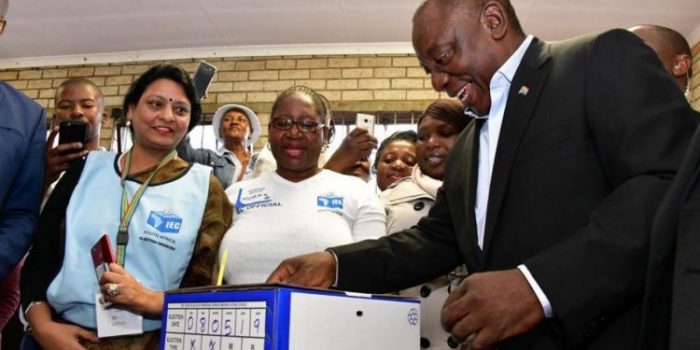 South Africans have gone to the polls in national elections in which the ruling African National Congress (ANC), in power since 1994 remains the favourite to win despite corruption scandals, sluggish economic growth and record unemployment.
South Africans have gone to the polls in national elections in which the ruling African National Congress (ANC), in power since 1994 remains the favourite to win despite corruption scandals, sluggish economic growth and record unemployment.
Although the ANC has won all the five elections held in the country in the past, Wednesday’s vote is set to be an electoral test on whether the party has staunched a decline in popularity.
The party is tipped to win the vote but with a reduced majority and the result will reveal whether its new leader, President Cyril Ramaphosa can reverse growing resentment among the South African electorate.
Ramaphosa took over from scandal-tainted Jacob Zuma, under whose leadership the ANC saw the most significant drop in support since 1994.
The election comes 25 years since Nelson Mandela led the ANC to power in the country’s first multi-racial ballot which marked the globally-celebrated end of apartheid rule.
Support for the ANC has fallen in every election since 2004, with the party winning just 54 percent in 2016 local elections as compared with the 62 percent in the last national vote in 2014.
The 66-year-old Ramaphosa took office last year when Zuma was forced to resign as president by the ANC after a nine-year reign dominated by multiple corruption allegations and economic woes.
A former anti-apartheid activist and trade union leader who was Mandela’s apparent favourite to succeed him as president, Ramaphosa was outsmarted in that race, became a wealthy before serving as Vice President under Zuma.
Most opinion surveys and political analysts in the country however suggest that the ANC will secure nearly 60 percent of the vote, thanks to the Ramaphosa effect and a weak and fragmented opposition.
Of the 47 opposition parties in the race, only the main opposition centrist Democratic Alliance (DA) and the radical-left Economic Freedom Fighters (EFF) are major contenders.
The DA hopes to shed its image as a white, middle-class party as its first black leader, Mmusi Maimane is contesting in his first general election since he took the helm in 2015. The party is expected to consolidate on the 22 percent it won in 2014.
The radical leftist EFF founded just six years ago by a former ANC youth leader, Julius Malema is predicted to make major inroads, growing from 6.3 percent to a forecast 11 percent.
The party, which appeals mainly to young voters and the poor has centred its election campaign on its policy of seizing land from largely white owners to give to back to poor blacks.
Wednesday’s elections will also measure ANC’s provincial strength, with the party in a close fight with the DA for control of Gauteng, which includes the capital, Pretoria and the country’s economic hub, Johannesburg.
The party which wins the most seats in parliament in the elections which has an estimated 26.8 million registered voters, selects the president who will be sworn in on May 25.

White House Says Military Option Open On Greenland Acquisition
Trump Calls Case Against Maduro “Infallible” Ahead Of U.S. Court Appearance
South Africa Raids U.S. Refugee Processing Centre, Arrests Seven Kenyans
Time Magazine Names AI Visionaries ‘Person of the Year’